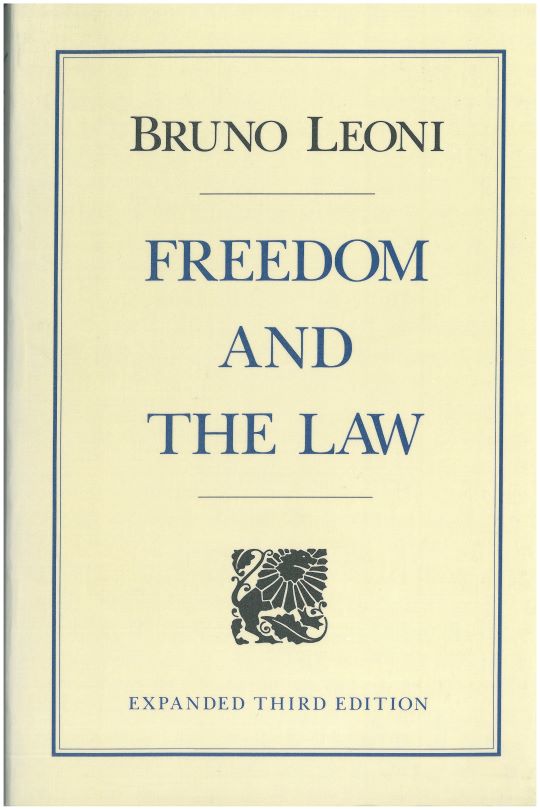Liberty Matters
Western Political Traditions and Polycentric Localism
 Leeson gives a hypothetical example where two people could benefit from exchanging items but they do not know about this possible trade. He says that, theoretically, a third party could take both items without either person’s permission and increase net benefits through “a property rearrangement.”
Leeson gives a hypothetical example where two people could benefit from exchanging items but they do not know about this possible trade. He says that, theoretically, a third party could take both items without either person’s permission and increase net benefits through “a property rearrangement.”Leeson concludes that we should not be concerned about consent and instead be concerned about net benefits, stating, “The wealth-centered defense is stronger. It is only possible, however, if one is willing to acknowledge that not just in hypothetical constructs but also in the world net benefits can be and in some very significant instances are created without consent.”
At the outset, I agree with Bouckaert’s criticism of Leeson, where Bourckaert says that allowing all sorts of rearrangements of property rights without people’s consent would create tremendous uncertainty in society.
Leeson quickly goes from arguing that, theoretically, one can think of some examples where two parties do not know that changes in property arrangements could increase “net benefits” to endorsing a system based on net benefits, whether or not consent is involved.
Leeson quickly goes from arguing that, theoretically, one can think of some examples where two parties do not know that changes in property arrangements could increase “net benefits” to endorsing a system based on net benefits, whether or not consent is involved.
One could certainly make a similar argument about a benevolent and hypothetically smart central planner. One can dream up a scenario where the Soviet planners of a hundred years ago knew more about technology and industrial production than the peasants. Likewise, it is not too difficult to think of a scenario where Tyson Foods knows much more about maximizing food production per dollar than small farmers do.
It is quite a leap, however, to now adopt as a normative standard letting third parties decide for others, whether that third party is Leeson’s benevolent redistributor, the Soviet authorities, or Tyson Foods. Yes, Tyson Foods likely could put many “underutilized” farmers to work, and society would have a lot more food. Leeson’s “net benefits” standard does not even require the underutilized farmers to be better off from the arrangement, provided the benefits to consumers and Tyson’s shareholders outweigh the workers’ losses.
Notice how quickly such a system devolves into illiberalism.
A fundamental aspect of markets is letting individuals decide what they want to do with their time, their labor, and their resources, for good or bad. An important aspect of markets is that they encourage producers of food to work for the consumers of food and that the more a company’s product is in demand, the more the company will need to hire workers and treat them well. So markets encourage a harmony of interests where people work to serve one another.
The consent question lets an individual opt in or opt out. Consent lets an individual make a market exchange—or keep his cigar if he doesn’t want to give it or sell it to someone else. Consent lets one accept a job—or choose not to if he doesn’t want it.
Replacing a consent standard with a “net benefits without consent” standard may appeal to a select few economists or picaroons in Hyde Park.
To me, and many others, the more appealing standard is that individuals be able to decide whether they give away their cigars or their money.
Even if one believes that some amount of private and governmental crime will always persist, consent can be the gold standard by which actions are judged. Consent can also be the gold standard by which legal arrangements are judged.
Not all arrangements live up to that ideal, but as Lottieri points out, some do. Lottieri mentions “the wide network of private cities in which companies offer the basic services of a political order in competitive markets, such as protection of property, among others.” He also brings attention to the Hanseatic League and the Dutch provinces as having more consent in their societies than societies with strong centralized states.
Lottieri contrasts the sovereign-state worldview with a “tradition more oriented to respecting self-governing communities in order to safeguard the autonomy of civil society.”
I agree with Lottieri and Bouckaert that Leoni did not make the definitive case for a free society. Leoni could have gone further. But he did help to better our understanding of pure freedom with his “quasi-anarchical vision.”
I also agree with Lottieri’s comment on my discussion when he states that contracts presume certain ground rules: “parties to the game have to be recognized as legitimate actors: free, able to negotiate, legitimate owners of their goods, and so on.”
These ground rules should be the starting point, and from there we can appreciate all voluntary exchanges that take place. Individuals accept the autonomy of others and work with them and for them, with their consent.
A society purely based on consensual relations, not one based on coercion for some greater good, is the gold standard.
Copyright and Fair Use Statement
“Liberty Matters” is the copyright of Liberty Fund, Inc. This material is put on line to further the educational goals of Liberty Fund, Inc. These essays and responses may be quoted and otherwise used under “fair use” provisions for educational and academic purposes. To reprint these essays in course booklets requires the prior permission of Liberty Fund, Inc. Please contact oll@libertyfund.org if you have any questions.